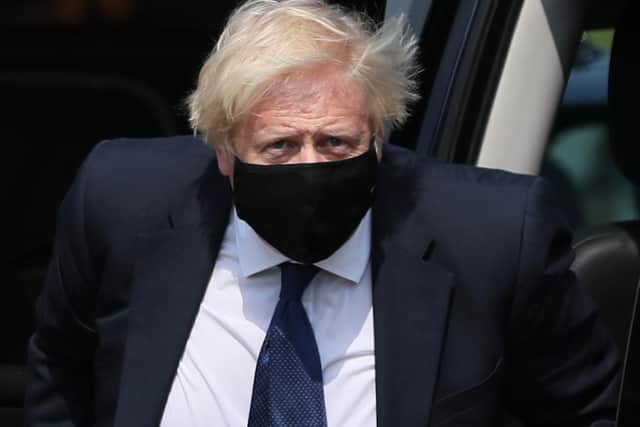Alex Kane: Boris Johnson, with his jibber-jabber and waffle, is no champion of the Union


My dad was born in 1906. My mum in 1917. They were born when all of Ireland was one country within the United Kingdom. Until shortly before he died, I still remember my dad driving us to places in Sligo, Monaghan (fairly close to Armagh, where we lived), Mayo, Galway, Limerick and Bray to meet up with distant relatives and old friends of the family. Neither he nor my mum had any hatred of ‘the South’, or Catholics, or even nationalists in the new Northern Ireland; and never passed down to me any of those hatreds.
But they never had any doubts about their personal political, constitutional and national identity: they were British first and foremost and content to remain so. They weren’t happy with partition – as many unionists, particularly those close to what became the border, weren’t – but accepted it as the price to be paid for remaining within a modified form of the United Kingdom. They were too young, of course, 15 and four respectively, to have been fully aware of the debate raging around them in 1921, but I never heard either of them retreat from their unionism before their deaths – and my mum lived long enough to see the Good Friday Agreement and Sinn Fein in government.
Advertisement
Hide AdAdvertisement
Hide AdThey were both interested in politics (indeed, I think my own nerdiness is due entirely to them) and I had long, long conversations with them about local politics. What I found fascinating was their memories of their parents’ reactions to life before and after partition. Both sets of my grandparents were in their late teens, or slightly older, during the Home Rule Crisis which kick-started in the mid-1880s. Grandfather Thomas used to collect newspapers and political posters, but made the mistake of storing them in his drapery shop in Armagh, which was burned down, if memory serves me, in 1912.


On Easter Tuesday, April 9, 1912, two days before the government introduced the Third Home Rule Bill, Thomas was at Balmoral in south Belfast to hear Andrew Bonar Law, leader of the Conservative and Unionist Party, speak: “With all solemnity, you must trust in yourselves. Once again you hold the pass – the pass for the Empire. You are a besieged city. The timid have left you; your Lundys have betrayed you; but you have closed your gates. The government have erected by their Parliament Act a boom against you to shut you off from the help of the British people. You will burst that boom. That help will come, and when the crisis is over men will say to you in words not unlike those used by Pitt – you have saved yourselves by your exertions and you will save the Empire by your example.”
My dad, nearly six at the time, could still remember the excitement of that day when he talked to me about it around 1972/3 (he would have been in his late-60s by then). He could still remember the group of people who gathered at the house to prepare for the train journey to see the man who “would help them save the United Kingdom, the Empire and the unity of Ireland”. I remember asking him what Thomas had made of it all and he replied something along these lines: As he got older he became increasingly convinced that Edward Carson was right to say that Irish/Ulster unionists had just been puppets for the Conservatives.
I was reminded of that conversation when I listened to Boris Johnson’s jibber-jabber in Belfast last week. He made it sound as though he was serious in his commitment to the Union, yet across his every word lay the shadow of Carson’s speech about Conservatives in 1922. And try as I might I could not bring myself to believe that he was the sort of champion that the Union needed right now; and certainly not the man to make the case for the constitutional integrity of the United Kingdom. His priority, I fear, is bolstering the identity wrapped in a rebooted English nationalism/populism (from which his votes come) rather than promoting a bigger, broader, pan-UK identity.
Advertisement
Hide AdAdvertisement
Hide AdCelebration and commemoration is as much about understanding the present and the future as it is about recalling or recalibrating the past. Anyway, the past is always a different, often unrecognisable place. The perceived winners and losers from a century ago may have switched places over the succeeding decades, or disappeared altogether. Old quarrels may have been washed away by a new form of cooperation and trust; although sometimes those quarrels may, instead, have been bolstered and reinforced by the flying buttresses of next generation hatreds and newly minted irreconcilables.
Two things are uppermost in my mind, though: the unionist majority upon which partition was built in 1921 is no longer solid; and it seems to me – and maybe I’m wrong – that there is a section of unionism which is prepared to listen to a debate around the question, ‘Is Northern Ireland better served by membership of a United Kingdom outside the EU, or by a united Ireland within the EU?’.
I support the UK position, but I am aware of increasing numbers of people (who, interestingly and potentially worryingly, describe themselves as coming from a pro-Union background rather than being unambiguous unionists) who strike me as ‘persuadable’.
The key to ‘persuadable’ is that it works both ways. Convince them and you win them. It is also an argument that applies to Scotland as much as here. I hope the membership of his new forum for the 2021 commemoration will embrace and prioritise what I’ve described as the bigger, broader, pan-UK identity, rather than being swayed by Johnsonian waffle and his hand-me-down Kipling jingoism.